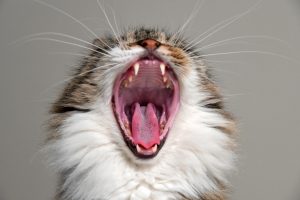Cats can indeed hiccup, just like humans and other animals. Hiccups are a common condition that is caused by involuntary contractions of the diaphragm, the muscle that separates the chest and abdominal cavities. These contractions can cause a sudden intake of air, which produces the characteristic “hic” sound that is associated with hiccups.


Hiccups are a normal bodily function that can occur in both humans and animals, including cats. In most cases, hiccups are harmless and will resolve on their own without any treatment. However, in some cases, hiccups can be a sign of an underlying medical condition, and it is important to pay attention to your cat’s hiccups and seek veterinary care if necessary.
There are a number of different causes of hiccups in cats. In many cases, hiccups are triggered by eating or drinking too quickly, which can cause the cat to swallow a large amount of air. This can lead to contractions of the diaphragm, resulting in hiccups. Other common causes of hiccups in cats include excitement, anxiety, or stress. In some cases, hiccups may also be caused by an underlying medical condition, such as gastroesophageal reflux disease (GERD) or an obstruction in the digestive tract.
It is important to note that hiccups are not always easy to detect in cats. Unlike humans, who can hiccup audibly, cats may not make the characteristic “hic” sound when they hiccup. Instead, you may notice your cat making odd facial expressions or movements, such as opening their mouth or jerking their head. You may also notice your cat making swallowing or gulping movements, which can be a sign of hiccups.
If your cat is experiencing hiccups, there are a few simple steps you can take to help them feel more comfortable. First, try to calm your cat and reduce any stress or anxiety they may be experiencing. This may involve providing them with a quiet, comfortable space to rest, playing with them, or providing them with treats or other forms of positive reinforcement.
In some cases, gently rubbing your cat’s chest or belly may also help to stop their hiccups. This can help to relax the diaphragm and stop the contractions that are causing the hiccups. You can also try offering your cat small amounts of water or other liquids to help them swallow and relieve their hiccups.
If your cat’s hiccups persist or they seem to be experiencing discomfort or other symptoms, it is important to bring them to a veterinarian for a thorough examination. The veterinarian will be able to determine the underlying cause of your cat’s hiccups and recommend the appropriate treatment. In some cases, treatment may involve medications or other therapies to address any underlying medical conditions that may be causing the hiccups.
Overall, hiccups are a common condition that can occur in cats, just like in humans and other animals. In most cases, hiccups are harmless and will resolve on their own without any treatment. However, if your cat’s hiccups persist or they seem to be experiencing discomfort or other symptoms, it is important to bring them to a veterinarian for a thorough examination and appropriate treatment. By paying attention to your cat’s hiccups and seeking veterinary care as needed, you can help ensure their continued health and wellbeing.






